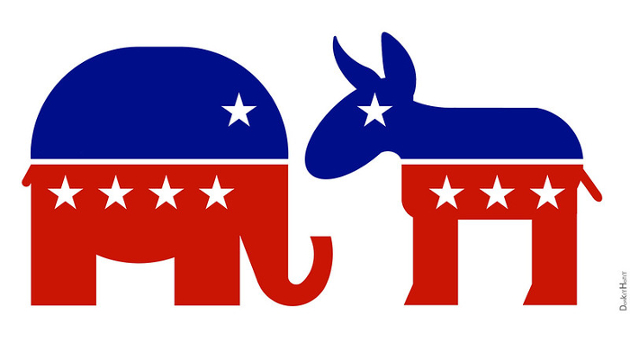The best feature of libertarians is that we are very principled and look at everything through the lens of the non-aggression principle.
 By contrast, the worst feature of politics, as explained by the Ninth Theorem of Government, is that it encourages people look at everything through the lens of partisanship.
By contrast, the worst feature of politics, as explained by the Ninth Theorem of Government, is that it encourages people look at everything through the lens of partisanship.
In other words, there’s a desire to always make your team look good and the other team look bad, even if you have to torture data.
Here’s an example.
In a column for the New York Times, Michael Tomasky asserts that Democratic presidents have a much better track record on the economy than their Republican counterparts.
Mr. Biden and his party’s No. 1 job between now and Election Day: Make it clear that Democrats have been better stewards of the economy — for decades, and by far. Many people don’t believe this. …But it’s true. …the country has done better
for decades under Democrats, by nearly every major economic measure. From John Kennedy through Barack Obama — 56 years during which, as it happens, we had a Democratic president for 28 years and a Republican president for 28 — we saw more than 50 million jobs created under Democrats and just 24 million jobs created under Republicans. Even the stock market has performed better under Democratic presidents. …just toting up numbers by the months each party had in power is imprecise. But there’s no better way to do it.
Any decent social scientist will quickly identify are all sorts of problems with Tomasky’s methodology.
- What about the impact of which party has full or partial control of Congress?
- Is it right to blame (or credit) presidents for what happens in their first year or two, before they’ve had a chance to enact and implement new policies?
- Should other variables be measured, such as median household income or labor force participation?
But let’s set aside these concerns, as well as others that can be listed, and accept Tomasky’s numbers. Does this mean that the economy does better when Democrats are in the White House?
That’s certainly a possible interpretation, but it’s far more accurate to say that the economy does better when a president – regardless of party – adopts good policy (or, to be more accurate, if good policy is implemented during their presidency).
 I’ve previously ranked presidents based on what happened to the burden of government spending during their tenures. And one thing that stands out is that Republicans seem to be even worse than Democrats – even when looking at what happened to domestic spending (with Reagan and Johnson being the only two exceptions).
I’ve previously ranked presidents based on what happened to the burden of government spending during their tenures. And one thing that stands out is that Republicans seem to be even worse than Democrats – even when looking at what happened to domestic spending (with Reagan and Johnson being the only two exceptions).
And I’ve also graded many of the modern presidents (Richard Nixon, Ronald Reagan, George H.W. Bush, Bill Clinton, George W. Bush, Barack Obama) based on their overall record on economics. If you peruse their performances, you’ll see there’s no obvious connection between good policy and partisan affiliation.
But I’ve never put together a best-to-worst list, so here’s my ranking of every president since Kennedy.
Let me elaborate – and also add some caveats.
For what it’s worth, I don’t think there’s good modern-quality data on JFK (or, to be more accurate, I’ve never searched for it), but I included him since he’s part of Tomasky’s analysis. That being said, he may be ranked too low. Yes, he spent too much money and implemented some bad policies, but he also lowered tax rates and pushed for free trade.
I also think it’s too early to grade Trump, but I included him since I know that will be of interest to readers. As you might imagine, I like what he’s done on taxes and red tape, but his record on other issues is bad – and getting worse. I’m especially concerned about the consequences and impact of the Fed’s easy-money policy, an approach Trump certainly supports.
Johnson and Nixon are unambiguously terrible, while Reagan is the star performer.
Clinton was surprisingly good (feel free to give the credit to Newt Gingrich if you want, but we didn’t need veto overrides to get the good policies of the 1990s).
The rest of the presidents were generally bad. I put them in reverse chronological order since I didn’t see any logical way of differentiating between them.
I can’t resist citing one more segment from Tomasky’s column.
Republican failures are not an unhappy coincidence. They’re a result of conservative governing practice. Republicans no longer fundamentally believe in the workings of government, so they don’t govern well. Their contempt for government is a result of conservative economic theory.
This is nonsense, as should be obvious from what I’ve already written. Republicans do not have a track record of “conservative governing.”
With one exception. We had relatively competent governance from the one GOP president who did have a “contempt for government” (actually, just contempt for big government).
———
Image credit: DonkeyHotey | CC BY 2.0.


